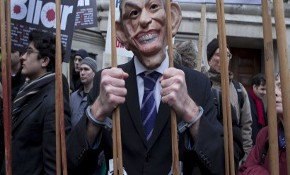Today we know from worldwide opinion polls the extent of the gap between public attitudes towards foreign affairs and the policies pursued by their democratic leaders.
Those in power believe that, come the next election, economic and domestic issues will predominate and that popular views can be largely ignored. Opinion polls also show how widely political sympathies can diverge even between countries which supposedly have the same culture and strategic interests.
The gap between the American presidential candidates whom that country’s allies would like to lead the West and the candidate whom the US public choose in their elections has long been the subject of comment in Europe and elsewhere.[1] European publics were often troubled during the Cold War years by US policies on arms control and nuclear weapons. In 1983 48% of the British population disapproved of their government’s decision to allow the US to base cruise missiles in Britain and only 37% approved.[2] In 1986 one British opinion poll showed that 32% believed the United States posed the greater threat to peace in Europe and 33% believed the Soviet Union did so.[3] Despite such strains, and they were more acute in many other allied countries, NATO has lasted well beyond the demise of the Soviet Union. Similarly, Pakistani governments survive despite public hostility to their friendship with the West; in a recent poll 78% expressed distrust of the United States and 67% of Britain.[4] An important test was public reaction to the death of Osama bin Laden. Half the population said they were saddened by his killing and only 11 percent professed themselves happy; 44% said that he was a martyr and 28% that he was an outlaw. The level of distrust for their government and the West was reflected in the fact that almost half said that the event was staged and that bin Laden was not there; how some reconciled this with feeling saddened by the US attack is unclear. [5]
Most of us have a pragmatic view of governmental responses to public opinion. If the government follows a policy which we and only a minority support, we speak of ‘strong’ leadership; if we and the majority disagree with the policy, we criticise ministers for imposing their views on a reluctant public. It was Edmund Burke who made the most famous defence of a representative’s right to ignore the opinions of his constituents if he believed himself justified:
In such a discordance of sentiments it is better to look to the nature of things than to the humours of men. The very attempt towards pleasing everybody discovers a temper always flashy, and often false and insincere. [6]
Governmental pragmatism about public opinion is sometimes justified; when the US public turned against the Vietnam War after the Tet offensive, the administration could not withdraw overnight. But governments are more likely to be afflicted with group thinking or dominated by a strong leader than the public as a whole. Polls showed in 1956 that the British electorate’s reaction to the nationalisation of the Suez Canal was wiser than the Eden government’s. Similarly, the US and British electorates held more sensible views on policy towards Iraq before the invasion of that country in March 2003 than their governments.[7]
It is now accepted that the Bush administration and the Blair government pushed the two countries into war on the basis of the pretexts that Iraq was producing chemical and biological weapons, and was giving support to al-Qaeda, which were mistaken.[8] This has certainly contributed to scepticism about governments’ claims to greater knowledge or wisdom than the general public. It also fostered disillusionment with politics; Blair was repeatedly re-elected but on a very low turnout; 84% of the electorate voted in 1950, less than 60% in 2001. In his 2005 victory he had the support of just 21.6% of the electorate.[9]
Greater modesty amongst government Ministers and increased willingness to take public opinion about foreign affairs seriously might help to reduce such apathy. Paradoxically, however, because polls have shown that elections are not decided by foreign policy and that the public rally round a government once it has taken the country to war, politicians are much less concerned about public opinion on foreign affairs than they were in the inter-war period.[10]
Burke was right that representatives should not always bend to popular views but these deserve consideration, not so much because the public will punish politicians for their foreign policy failures, as because they have shown that their judgements can be right and the politicians wrong.
References:
[1] ‘World wants Kerry as president’, BBC, http://216.109.124.98?search/cach?p=globescan&ei, downloaded 20 November 2004; ‘The world has no vote but it knows what it wants’, The Times, 4 November 2008.
[2] ‘Most people opposed to unilateral disarmament’, The Guardian, 22 October 1983.
[3] Clive Rose and Peter Blaker, An Opinion Poll on Defence and Disarmament, Institute for European Defence and Strategic Studies, London, 1986, table nine.
[4] ‘Opinion Polls released during June 20 2011 to June 24 2011’, Gallup/Gilani Research Foundation, p. 2.
[5] ‘Pakistani views on the death of Osama bin Laden’, Gilani, 16 May 2011
[6] ‘Speech at Bristol’, Burke’s Writing and Speeches, Volume 111, The World’s Classics, Oxford University Press, undated, p. 3.
[7] See the discussion in Philip Towle, Going to War: British Debates from Wilberforce to Blair, Palgrave/Macmillan, Basingstoke, 2009, pp. 135-141.
[8] Bob Woodward, Plan of Attack, Simon and Schuster, London, 2004; Tom Bower, ‘Blair’s defence over Iraq is crumbling’, The Times, 3 February 2007; Ken Macdonald, ‘Intoxicated by power, Blair tricked us into war’, The Times, 4 December 2009;William Rees-Mogg, ‘Blair the dictator bulldozed us into war’, The Times, 1 February 2010
[9] ‘National Turnout’, The Times, 6 May 2005; ‘Political pruning leaves the landscape unchanged’, The Times, 9 May 2005.
[10] Philip Towle, ‘Taming or demonising an aggressor: The British debate on the end of the Locarno system’, in Gaynor Johnson, Locarno Revisited: European Diplomacy 1920-1929, Routledge, London, 2004, 20 pp.









